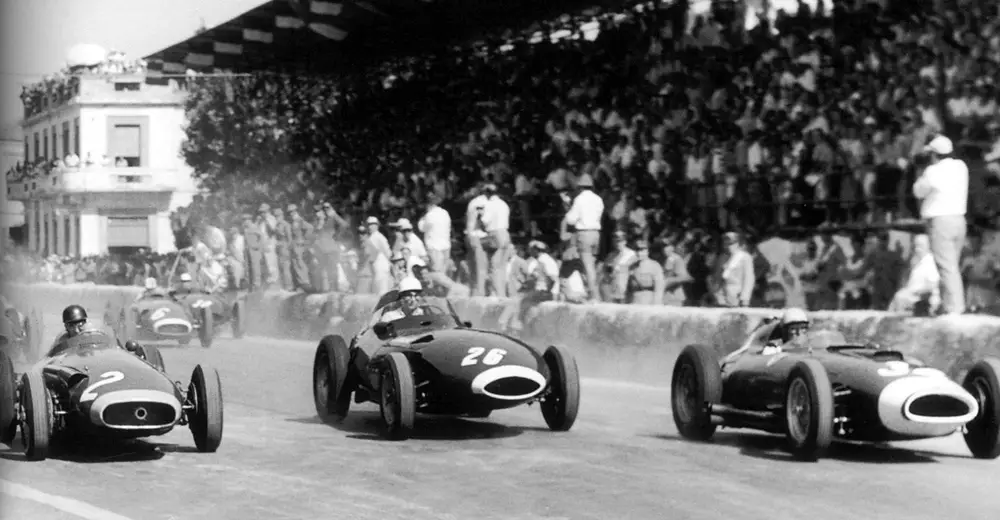Every driver aspires to have the lead of the Formula 1 Drivers’ Championship – but which drivers have held the largest F1 points lead record in the sport’s history? We take a look back at the drivers who have had the biggest championship advantages and the races at which they secured the record.
Header image: © Andrew Balfour
3 points: 1950 British Grand Prix, Farina
Giuseppe Farina was the first driver to lead the Drivers’ Championship with a three point advantage over Alfa Romeo team-mate Luigi Fagioli after the 1950 British Grand Prix. At this race, eight points were awarded for a win and six for second place. An extra point was awarded for the fastest lap, which was claimed by Farina.
6 points: 1950 Swiss Grand Prix, Farina
After the next two rounds of the 1950 Drivers’ Championship – the Monaco Grand Prix and the Indianapolis 500 – the standings were tied. At the 1950 Swiss Grand Prix, Farina extended his lead to six points with another victory. Juan Manuel Fangio went on to equal Farina’s record with a six point advantage at the conclusion of the 1951 British Grand Prix.
10 points: 1951 German Grand Prix, Fangio
Farina’s six-point record set at the 1950 Swiss Grand Prix was not beaten until over a year later, when Juan Manuel Fangio led the Drivers’ Championship by ten points after the 1951 German Grand Prix. Alberto Ascari won the race, but with Fangio finishing second and nearest championship rival Giuseppe Farina retiring from the event, Fangio stretched his advantage to a new record.
14 points: 1952 German Grand Prix, Ascari
Juan Manuel Fangio’s record was beaten at the German Grand Prix one year later as Alberto Ascari won and held a fourteen point lead over his countryman Piero Taruffi. Ascari would go on to equal his own record at the 1953 French Grand Prix. The Italian driver finished only fourth in that race, but it was enough to eke out a further advantage in that year’s championship hunt.

17 points: 1953 British Grand Prix, Ascari
At the next round, at Silverstone, Ascari picked up 8.5 points – eight points for the win and half a point for a shared fastest lap. With nearest title rival Mike Hawthorn picking up only two points, Ascari’s advantage was extended to 17.5 points. This was the biggest lead that Ascari ever held in the Drivers’ Championship.
18.52 points: 1954 German Grand Prix, Fangio
Juan Manuel Fangio re-claimed this record at the 1954 German Grand Prix. At the previous round – the British Grand Prix – seven drivers had claimed the fastest lap, and they all shared a single point for doing so. With half points having also been awarded at the Belgian Grand Prix to Mike Hawthorn and José Froilán González, there were all kinds of fractions of points. After the race at the Nurburgring, Fangio led the Drivers Championship by being 18.52 points ahead of fellow Argentinian Gonzalez.
23 points: 1957 Pescara Grand Prix, Fangio
Fangio extended the record for a final time three years later as a result of finishing second to Stirling Moss at the 1957 Pescara Grand Prix. Moss overtook Luigi Musso for second in the title hunt, while Fangio remained at the head of the pack with a 23 point lead. Fangio had already secured his fifth and final title at the previous round in Germany.
27 points: 1963 Italian Grand Prix, Clark
Fangio’s record would remain for six years, before being beaten at the 1963 Italian Grand Prix. After getting to within one point of the Argentine’s record as a result of the British Grand Prix, Jim Clark extended his title lead to 27 points as a result of the Monza race. Clark’s lead was unbeatable and his win at Monza secured him his first World Championship. This was the only time in his career that Clark set a new record for the largest points lead.
28 points: 1969 British Grand Prix, Stewart
Jackie Stewart lapped the entire field on his way to victory at Silverstone in the 1969 British Grand Prix. The win extended his championship lead to 28 points and saw him topple fellow Scot Jim Clark’s points lead record six years after it was set.
29 points: 1969 German Grand Prix, Stewart
Stewart went on to extend his championship lead – and the all-time points lead record – by a solitary point at the 1969 German Grand Prix. Stewart finished second to Jacky Ickx in the Nurburgring race, with Ickx moving up to second place in the Drivers’ Championship.
36 points: 1969 Italian Grand Prix, Stewart
The largest lead that Jackie Stewart ever had in the Drivers’ Championship was 36 points, achieved after winning the 1969 Italian Grand Prix. This was the race at which he secured his first title. Impressively, Stewart’s record would stand for 23 years – though it was equalled twice in that time. Niki Lauda also had a 36 point advantage in the Drivers’ Championship after the 1976 Monaco Grand Prix; although this was because James Hunt had been disqualified from the Spanish Grand Prix two rounds previously. Hunt was later reinstated as the winner of that race. The 36 point lead was also equalled by Nigel Mansell at the conclusion of the 1992 British Grand Prix.
46 points: 1992 German Grand Prix, Mansell
Nigel Mansell was the man who finally toppled Jackie Stewart’s record, doing so one race after he equalled the record. By the time Stewart’s record was beaten, ten points were now on offer for a race victory. With a win at the 1992 German Grand Prix, Mansell extended his advantage over Riccardo Patrese to 46 points.
52 points: 1992 Hungarian Grand Prix, Mansell
With a second place finish at the Hungarian Grand Prix, Nigel Mansell secured the 1992 Drivers’ Championship and with it set a new record for the biggest points lead. His advantage extended to 52 points.
54 points: 1992 Belgian Grand Prix, Mansell
With his title now confirmed, Nigel Mansell extended his record further two weeks later at the Belgian Grand Prix with another second place finish.
58 points: 1992 Portuguese Grand Prix, Mansell
Mansell extended his points lead once more in the 1992 season to 58 points after the Portuguese Grand Prix, and that would remain the record for the largest points lead for the next ten years. Michael Schumacher equalled Mansell’s 58 point advantage at the 2001 Japanese Grand Prix – the final race of his second title-winning year with Ferrari.
62 points: 2002 French Grand Prix, Schumacher
Michael Schumacher dominated the 2002 season and clinched his fifth Drivers’ Championship at the 2002 French Grand Prix. After the race at Magny Cours, Schumacher led the already decided title hunt by a record 62 points.
66 points: 2002 German Grand Prix, Schumacher
Another win for Michael Schumacher at the 2002 German Grand Prix saw him extend his points advantage to 66 – a new record secured at his home event.
67 points: 2002 Hungarian Grand Prix, Schumacher
Another weekend, another record. Michael Schumacher’s second place finish at the 2002 Hungarian Grand Prix – finishing behind team-mate Rubens Barrichello – stretched out his title lead by one more point.
71 points: 2002 Belgian Grand Prix, Schumacher
Michael Schumacher extended the points lead record for a fourth consecutive weekend at the 2002 Belgian Grand Prix. His win at this event extended his lead to 71 points – the largest points lead that the German would have in his career, and a record which would stand for almost a decade.
77 points to 134 points: 2011 European Grand Prix to 2011 Indian Grand Prix, Vettel
A new points-scoring system was introduced in 2010, awarding 25 points for a win and making F1’s points lead record a little easier to attain. Sebastian Vettel dominated the season in 2011, and given the new system it is no surprise that Schumacher’s points lead record tumbled.
After the eighth round of the year, the 2011 European Grand Prix, Vettel led the title race by 77 points. Vettel would set a new F1 points lead record eight more times over the next ten rounds. His biggest advantage in the 2011 title hunt came after the Indian Grand Prix, when he led by 134 points.
145 points: 2013 United States Grand Prix, Vettel
Sebastian Vettel had another dominant season in 2013, winning all of the last nine races of the championship. After winning the penultimate race of the year, the 2013 United States Grand Prix, Vettel extended the points lead record to 145.
155 points: 2013 Brazilian Grand Prix, Vettel
With his ninth successive victory at the 2013 Brazilian Grand Prix, Sebastian Vettel set a new Formula 1 points lead record, ending the season with a 155 point advantage. Vettel’s record stood for just short of ten years. Lewis Hamilton came close to beating it in 2020, leading the title race by 131 points after the 2020 Bahrain Grand Prix and Max Verstappen came even closer to beating it at the end of the 2022 season. Verstappen won the 2022 Drivers’ Championship by 146 points.
177 points to 290 points: 2023 Japanese Grand Prix to 2023 Abu Dhabi Grand Prix, Verstappen
Max Verstappen finally broke Sebastian Vettel’s record at the 2023 Japanese Grand Prix. After the longest run of Formula 1 wins in history, Verstappen went on to claim his 13th win of the season at Suzuka and his championship lead over his team-mate rose to 177 points.
From the Suzuka race onwards, Verstappen’s championship lead continued to increase with every passing round. His title-winning weekend at the 2023 Qatar Grand Prix saw him become the first driver to lead the championship battle by over 200 points. By the time the chequered flag fell on the 2023 season, Verstappen’s points lead stood at an incredible 290 points.
Verstappen finished on the podium at all but one race in 2023 and was aided in building up a bigger points lead than Vettel’s previous record through the addition of points-paying Sprint races.
Header image: Morio, Wikimedia Commons / CC BY-SA 3.0
This article was originally published in February 2021 and has since been updated.

